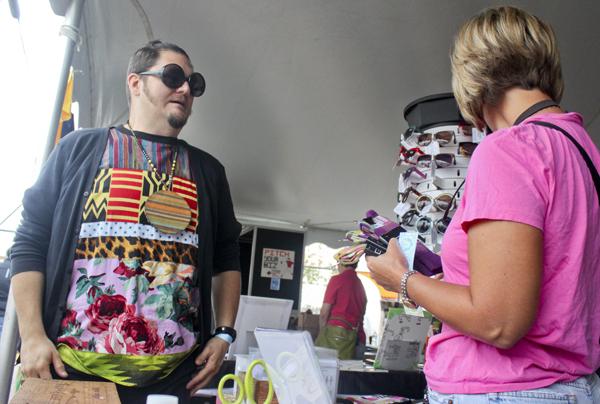Tucked between about 200 people selling neon posters and Rice Krispie treat-shaped handmade soaps, famed fashion designer Jay McCarroll said he noticed a chaotic buzz at Union Market this weekend.
Anywhere else, the annual Crafty Bastards fair – which displays everything from handmade pottery and jewelry to recycled clothing – would have been just another arts and crafts show, McCarroll said from his booth.
But in D.C., “these people are hungry. They’re hungry for fun stuff, which is nice because…Washington doesn’t have an over-saturation of these kinds of things,” McCarroll, the winner of the first season of Project Runway, said as he sold baseball tees, skirts and scarves in his signature funky, clashing prints.
“It’s good for the creative entrepreneurs who are here,” he added.
To earn the chance to sell to the thousands of arts appreciators who flock to the festival, all vendors go through an extensive application process by a jury that stresses “high-quality, handmade, alternative items.”
Elizabeth Graeber and Jillian Yoffe, graduates of the illustration program at Maryland Institute College of Art, have been preparing for the Crafty Bastards fair intensely for the past few months.
Yoffe studied illustration and book arts, learning about craft shows from a professor. This is her first year as a vendor.
Based out of her Baltimore studio, Yoffe specializes in pet portraits and hand lettering, transforming objects ranging from paper to bags and shirts.
“I’m really excited to see how that market responds to my work,” said Yoffe. “I just like to draw things so that if somebody were wearing something or holding something, somebody else would point it out and say, ‘Wow, that’s really cute.’ That’s my favorite thing about it – making other people smile.”
Many, like Graeber, are well known in the local scene: Graeber just finished a mural for D.C. bakery BakeHouse and illustrated a cocktail book. She regularly attends flea markets, such as the one at Eastern Market, for inspiration.
Graeber and Yoffe both work on commission, as opposed to being part of a company, which Yoffe said gives her a feeling of control and personal ownership over her work.
“It feels really good to have something that you created, to hold a product that feels mass-produced, but it’s something from a really small run that you designed and did yourself,” Yoffe said.








